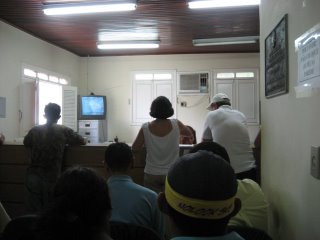Bureaucracy, Brazilian Style

Brazilians love bureaucracy. They won't admit it, of course--they're much more likely to curse than to praise locales, like the one pictured here, known as cartorios. The cartorio is the rough equivalent of the notary public. But when was the last time you had to wait for an hour to get something notarized? When was the last time you had to get something notarized, period? Most of us rarely have to do so, and when we do, like I had to do not that long ago with a request for an inquiry into my criminal history for my visa, it is a quick matter of popping into our bank or visiting that coworker who has a notary commission.
Not in Brazil. Here you have to visit the cartorio anytime you sign a contract, get married, even apply for a phone line. You have to get a stamp certifying your signature is like the one they have on file for you, or have your documents officially authenticated by comparing your photocopies to the originals. In order to register with the Federal Police, I was required to photocopy and authenticate every page of all four of our passports--even the blank pages! The woman who helped me at the desk sloughed off the authentication job to some pimply teenager. When he returned about twenty minutes later she seemed to think it was too quick: did he REALLY look it over closely, she asked? It's VERY serious, she told some other people waiting...a colleague got fired for playing it too fast and loose. Well, I'm impressed: it took me a whole morning just to go to the bank (a topic for another post) to pay our furner taxes, and to get our passport photocopies authenticated.
For the average Brazilian the cartorio is a hassle. So what do I mean when I say that they love bureaucracy? I think it has to do with a sense that "they" are making sure everything is done properly, that things really "count" in a way that is assured by the sweaty moments spent waiting in the cartorio, by the handsome stickers pasted on the documents and the authoritative whack! of the rubber stamp descending over it all.
Am I reading too much into it? Don't think so, but I'd have to think more closely about the meaning of the Japanese cartoons, visible on the TV in the background, that entertain those waiting for their encounter with officialdom.




